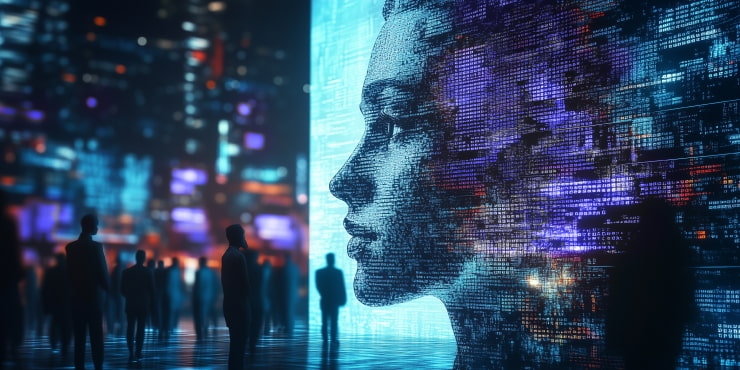Generative AI in Political Advertising

The first notable use of AI technologies in political campaigns occurred in the last decade. The previous couple of years have seen a significant increase in popularity. Politicians and political parties are now using digital tools. These include chatbots to interact with public content and create an effective advertising campaign. Machine learning algorithms for voter targeting remain practical. ChatGPT, Jasper, is one of the most popular tools. They are typically used to develop communication strategies.
Most people think of artificial intelligence (AI) in politics as visual or audio media. Campaigns rely on it for quick scripting or text-to-speech capabilities. It's essential for creating voice covers with AI or even video. However, political parties use it for data and research. This happened long before ChatGPT became a household name. AI can enhance targeted promotions. It offers new opportunities and challenges. They are helpful for election campaigns in the digital age.
How Generative AI Is Transforming Political Advertising
AI technologies are revolutionizing how political campaigns craft and deliver their messaging. By leveraging machine learning, campaigns can analyze voter behavior. They may analyze sentiment to create highly tailored content that shapes political narratives. This allows for more dynamic and data-driven communication strategies. They better resonate with target audiences. Here are key examples of technology in political advertising.
How do machine learning and AI-generated content shape political narratives? Let's discuss:
- Sentiment analysis: Machine learning identifies trends in public opinion. It tailors messaging to reflect voters' concerns.
- Real-time narrative adjustment: AI adapts content based on evolving voter sentiment. It ensures messages stay relevant and impactful.
What is AI’s role in creating personalized campaign messages? Let's explore:
- Demographic-specific targeting: AI segments voters into groups based on age, location, or interests. It helps to deliver customized messages.
- Behavioral insights: AI analyzes past interactions. It predicts the type of content voters will likely engage with.
There are examples of political technology advertising:
- AI-powered chatbots: Campaigns use chatbots to provide real-time information. They also help to answer voter queries and promote key messages.
- Automated ad generation: Generative AI creates multiple ad variations. It allows for rapid platform testing and optimization.
- Social media campaigns: Political campaigns leverage AI-driven content. It adapts to different platforms. AI increases engagement and outreach.
Automated tools continue to evolve. Campaigns must effectively leverage these technologies. They will be better positioned to deliver compelling, relevant messages to voters. However, ensuring transparency and ethical use will be critical to maintaining public trust.
AI-Powered Messaging and Speech Generation
AI in politics is transforming how campaign messaging is generally created and delivered. With generative tools, political campaigns can craft persuasive speeches. They may forecast social media posts and press releases more efficiently and strategically. AI can generate well-structured and compelling content. It aligns with the campaign’s key themes. AI ensures a consistent message across all platforms.
How does AI craft campaign content? Let's explore:
- Speech writing: AI analyzes public sentiment and key talking points. They help to generate speeches that resonate with voters. It can also help refine tone and structure for maximum impact.
- Social media posts: AI tools can quickly create targeted posts. They address trending topics and voter concerns in real time.
- Press releases: AI automates the creation of press releases. It ensures they are concise, engaging, and tailored to various media outlets.
Using sentiment analysis and predictive text is important:
- Sentiment analysis: AI identifies public attitudes by analyzing social media and news trends. They allow campaigns to adjust messaging for a positive or empathetic tone.
- Predictive text: Machine learning predicts the phrases and themes most likely to engage voters. It enables campaigns to deliver highly relevant content.
Integrating AI and politics allows campaigns to be more responsive and agile. Political campaigns can amplify their messaging efforts by leveraging AI-driven insights and automation. They also shape public opinion more effectively. However, transparency and ethical considerations remain crucial. The use of AI in political messaging fosters trust rather than manipulation.
AI-Generated Videos and Deepfake Content
The rise in campaign activity has increased the use of AI-generated political announcements and synthetic videos. There are advancements in generative AI. Political campaigns can now produce dynamic video content quickly and cheaply. These AI-generated videos can be tailored to specific audiences. They help to deliver more targeted messaging. AI enhances engagement in digital political advertising.
The rise of AI-generated political ads and synthetic videos:
- Automated video creation: AI can produce multiple variations of political ads. It makes testing and optimizing messaging easier.
- Audience-specific content: AI tailors videos for different demographics. It ensures relevance across diverse voter groups.
- Virtual spokespersons: Synthetic video technology enables the creation of digital spokespersons. It allows the representation of campaign messages consistently and engagingly.
There are ethical concerns surrounding deepfakes and misinformation:
- Transparency: Artificial intelligence in politics necessitates clear labeling and ethical guidelines. It helps to ensure accountability and fairness.
- Manipulated content: Deepfakes can be generally used to spread misleading or false information. It potentially damages public trust.
- Authenticity issues: Viewers may have difficulty distinguishing between actual and AI-generated content. It leads to confusion or skepticism.
AI brings efficiency and innovation to digital political advertising. Managing ethical challenges is critical to ensuring responsible campaign practices. It also maintains voter confidence.
Ethical and Legal Challenges of AI in Political Ads

Automated tools and politics in advertising have sparked significant ethical and legal debates. AI allows for highly personalized and persuasive content. This also raises concerns about misinformation, voter manipulation, and the potential for deepfakes. These challenges call for careful consideration of using AI and politics. It helps to ensure fair, transparent, and ethical practices.
There is a debate over AI-generated misinformation and voter manipulation. Let's have a look:
- Manipulating public opinion: AI tools can craft messages that exploit emotions. They potentially influence voters’ decisions unfairly.
- Deepfake videos: AI can create realistic yet misleading movies. They misrepresent candidates or events. AI erodes trust in political discourse.
- Targeting vulnerable groups: AI can tailor messages to specific demographics. It may lead to exploiting vulnerable populations for political gain.
There are legal regulations on artificial intelligence and political content. Here are they:
- Lack of regulation: Many countries haven't clear rules for AI use in political campaigns. They leave room for misuse.
- Transparency requirements: There is a growing call for policies. They are requiring AI-generated political ads to be clearly labeled as such.
- Accountability for deepfakes: Some jurisdictions are implementing laws. They hold creators of misleading AI-generated content accountable.
| Challenge | Description | Potential Solution |
| Misinformation | AI can create misleading content that manipulates voters. | Implement regulations that require transparency in AI adverts. |
| Voter manipulation | AI adverts may exploit emotions to influence voter behavior unfairly. | Ensure ethical guidelines are generally followed in AI campaign strategies. |
| Legal regulations | There is no universal framework for AI-generated political content. | Create clear laws governing the use of AI in political campaigns. |
Balancing the power of AI and politics with ethical considerations is critical. It helps to ensure responsible and transparent political advertising.
Transparency and Accountability in AI-Driven Campaigns
AI campaigns become more prevalent in political advertising. The need for transparency and accountability grows. Voters must know when they are interacting with AI-generated content. It ensures that ethical practices are generally maintained. Without clear disclosure, AI could manipulate opinions or spread misinformation. Establishing guidelines for political campaign tools and AI-generated content will foster trust. It will also maintain fairness in political discourse.
Let's discuss the need for AI disclosure in political advertisements:
- Clear labeling: Political ads created by AI should be labeled as such. It helps to ensure transparency.
- Voter awareness: Disclosing AI involvement allows voters to understand the message's source.
- Ethical responsibility: Disclosure prevents potential misuse of AI to deceive or mislead voters.
There are strategies to prevent AI misuse and ensure ethical standards:
- Strict regulations: Governments should create rules governing AI use in political campaigns. They help to avoid manipulation.
- AI oversight committees: Form independent bodies. Monitor AI use in campaigns and enforce ethical practices.
- Transparency in targeting: Campaigns should disclose the data used for ad targeting. They should reveal how it influences content delivery.
How do politicians use marketing? Let's check some essential points:
- Personalized content: AI enables highly tailored messages to specific voter segments. They significantly improve engagement.
- Emotion-driven ads: Politicians use AI to generate content. It taps into emotional triggers, persuading voters.
- Cost-effective strategies: AI-driven automation reduces the costs of ad production and distribution. It makes campaigns more efficient.
AI campaigns can create fairer political landscapes by prioritizing transparency and ethical standards. Proper regulation and accountability are essential. Such measures help to prevent misuse. They also ensure responsible AI use in political promotion.
Public Perception and Trust in AI-Generated Content
The rise of digital tools has revolutionized how political campaigns communicate with voters. This has created significant controversy. AI in political adverts enables highly tailored messaging. Its impact on voter trust is complex. Transparency, authenticity, and bias management are critical for building public confidence.
How do AI-generated political ads impact voter trust and decision-making? Let's explore:
- Personalized messaging: AI tailors ads to voter preferences. It increases engagement but potentially leads to over-manipulation.
- Trust concerns: Voters may doubt the credibility of AI-generated content. It leads to skepticism about campaign authenticity.
- Influence on decision-making: AI’s ability to predict voter behavior can lead to subtle manipulation. It raises ethical concerns.
Addressing concerns over authenticity and bias is essential:
- Disclosure: Political ads created by AI should be clearly labeled. They will promote transparency.
- Algorithm fairness: Ensuring fair algorithms that avoid favoring specific candidates or groups. They reduce bias risks.
- Authenticity validation: Verifying the content’s truthfulness helps prevent misinformation. It builds public confidence.
There are challenges with AI-powered voter analysis tools in political campaigns:
- Deepfakes risks: AI-generated videos may mislead voters. They show fake or manipulated events, eroding trust.
- Data privacy: Collecting data for AI-driven campaigns can raise voter concerns. They are about privacy violations.
- Manipulation potential: The ability to precisely target ads may cross ethical lines. It unfairly influences decisions.
Building trust in AI in political campaigns requires balancing innovation with ethical considerations. Campaigns must promote transparency, reduce bias, and educate voters. By doing so, they can leverage the power of AI while maintaining public trust.
The Future of AI in Political Advertising

The evolution of AI advertising strategies transforms political campaigns. It offers more profound insights and more personalized outreach. Future advancements will focus on hyper-personalization, real-time adjustments, and ethical boundaries. Balancing innovation with regulatory oversight will be essential to ensure AI's responsible use.
There are predictions on how AI will evolve in political campaigns:
- Advanced audience segmentation: AI will create detailed voter profiles. They will deliver hyper-personalized campaign messages.
- Predictive decision-making: Machine learning will help campaigns adjust their strategies. These strategies are typically based on anticipated voter responses.
- Real-time ad adjustments: Campaigns will use AI to modify ads instantly for maximum impact. It is typically based on shifting voter sentiments.
- Multimodal content: AI will generate dynamic content that integrates text, video, and images. It allows campaigns to engage voters through diverse formats.
Balancing innovation with ethical concerns and regulatory measures is pivotal:
- Transparent labeling: Every AI political ad will need clear labels. They will distinguish it from human-created content, promoting transparency.
- Bias detection: Campaigns will generally be held accountable. This is crucial for ensuring their AI systems do not unfairly favor specific candidates or groups.
- Regulatory oversight: Governments may establish rules to limit AI misuse. They ensure compliance with voter protection standards.
Now, let's explore the challenges with the emergence of AI politician personas:
- Authenticity issues: AI-generated personas may lead to voter distrust. It happens especially if campaigns fail to clarify their origin.
- Manipulation risks: Simulated empathy or relatability from AI-driven personas could cross ethical boundaries.
- Deepfake proliferation: Sophisticated AI-generated videos may lead to misinformation. They also cause manipulation of voter opinions.
The future of AI political ad campaigns lies in leveraging innovation while safeguarding voter trust. Proper transparency, ethical guidelines, and robust regulations are essential. Political campaigns can responsibly use AI. It will help them to enhance engagement without compromising democratic values.
Conclusion: The Role of AI in Shaping Political Narratives
AI offers significant benefits in political marketing. They include personalized engagement, real-time content adaptation, and data-driven decision-making. It also presents misinformation, voter manipulation, and bias. The future of advertising will hinge on balancing innovation with accountability. It is mainly in the rise of the AI politician era. Follow Newo.ai to know the latest news.


